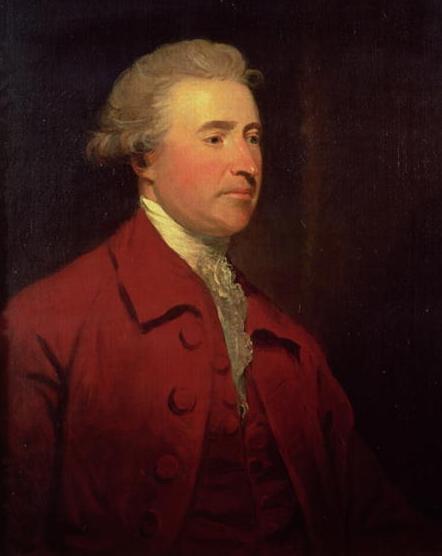Edmund Burke frasi celebri
“Tutti gli uomini che si rovinano, lo fanno dalla parte delle loro inclinazioni naturali.”
da Letters On a Regicide Peace, 1796
da Reflection on the Revolution in France, 1790
Riflessioni sulla Rivoluzione in Francia
Frasi sulle leggi di Edmund Burke
da Reflection on the Revolution in France, 1790
da Reflection on the Revolution in France, 1790
Riflessioni sulla Rivoluzione in Francia
Edmund Burke Frasi e Citazioni
1826, vol. III, p. 54 o 1963, p. 91; citato in Losurdo 2005, p. 130
da The Second Speech on Conciliation with America, 1775
Second Speech on Conciliation with America
“È lenta la marcia della mente umana.”
da The Second Speech on Conciliation with America, 1775
Second Speech on Conciliation with America
Edmund Burke: Frasi in inglese
“They talk as if England were not in Europe.”
The Speeches of the Right Honourable Edmund Burke in the House of Commons and in Westminster Hall, Volume 4 https://books.google.nl/books?id=P3o9AAAAcAAJ&pg=PA86&lpg=PA86&dq=edmund+burke+%22as+if+england%22&source=bl&ots=5zDSB68xOn&sig=XL30Pw27VyA2LHbMQObnDITiGrM&hl=nl&sa=X&ved=0ahUKEwjJjuL3sMbNAhXJrRoKHT1ABSIQ6AEIIDAB#v=onepage&q=edmund%20burke%20%22as%20if%20england%22&f=false, London, 1816, p. 86
As quoted in "Book review: Britain’s Europe: A Thousand Years of Conflict and Cooperation by Brendan Simms", in Prospect magazine (19 May 2016) http://www.prospectmagazine.co.uk/arts-and-books/book-review-britains-europe-a-thousand-years-of-conflict-and-cooperation-by-brendan-simms
Undated
“Religious persecution may shield itself under the guise of a mistaken and over-zealous piety.”
15 February 1788
On the Impeachment of Warren Hastings (1788-1794)
“The men of England — the men, I mean of light and leading in England.”
Volume iii, p. 365
Reflections on the Revolution in France (1790)
Letter to the Sheriffs of Bristol (1777)
“Vice itself lost half its evil by losing all its grossness.”
Volume iii, p. 332
Reflections on the Revolution in France (1790)
Part I Section XIV
Compare: Francis, Duc de La Rochefoucauld, Reflections, xv: "In the adversity of our best friends we always find something which is not wholly displeasing to us"
A Philosophical Enquiry into the Origin of Our Ideas of the Sublime and Beautiful (1757)
“The true danger is when liberty is nibbled away, for expedients, and by parts.”
Letter to the Sheriffs of Bristol (1777)
“An event has happened, upon which it is difficult to speak, and impossible to be silent.”
5 May 1789
On the Impeachment of Warren Hastings (1788-1794)
“Of this stamp is the cant of, Not men, but measures.”
Volume i, p. 531
Thoughts on the Cause of the Present Discontents (1770)
Referring to the Glorious Revolution of 1688
Reflections on the Revolution in France (1790)
Volume iii, p. 331
Reflections on the Revolution in France (1790)
28 May 1794
On the Impeachment of Warren Hastings (1788-1794)
Speech on the Independence of Parliament (1780)
Works of Edmund Burke Volume ii, p. 117
Second Speech on Conciliation with America (1775)
Speech at Bristol Previous to the Election http://books.google.com/books?id=DAAUAAAAYAAJ&pg=PA435&dq=%22we+are+generally+cold,+and+languid,+and+sluggish%22&hl=en&sa=X&ei=D4TSUuXqDYrekQe6uoH4Cw&ved=0CFAQ6AEwBQ#v=onepage&q=%22we%20are%20generally%20cold%2C%20and%20languid%2C%20and%20sluggish%22&f=false (6 September 1780)
1780s
“Jacobinism is the revolt of the enterprising talents of a country against its property.”
No. 1
Letters On a Regicide Peace (1796)
“There never was a bad man that had ability for good service.”
15 February 1788, Third Day, volume x, p. 54
On the Impeachment of Warren Hastings (1788-1794)
“You can never plan the future by the past.”
Letter to a Member of the National Assembly (1791)
A Letter to a Member of the National Assembly (1791)
Thoughts on the Cause of the Present Discontents (1770)
“The march of the human mind is slow.”
Works of Edmund Burke Volume ii, p. 149
Second Speech on Conciliation with America (1775)
Second Speech on Conciliation with America (1775)
Robert Bisset, The Life of Edmund Burke. Volume II (London: G. Cawthorn, 1800), pp. 428-9
Undated
Second Speech on Conciliation with America (1775)
Reflections on the Revolution in France (1790)
“Politics and the pulpit are terms that have little agreement.”
Reflections on the Revolution in France (1790)
